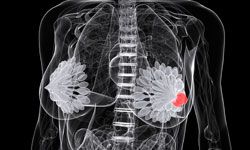Targeted Treatment for TNBC Currently in Preclinical Testing
Characterized by the absence of cell surface receptors for estrogen, progesterone and epidermal growth factor, triple negative breast cancer (TNBC) presents a formidable treatment challenge.
Characterized by the absence of cell surface receptors for estrogen, progesterone and epidermal growth factor, triple negative breast cancer (TNBC) presents a formidable treatment challenge.

Characterized by the absence of cell surface receptors for estrogen, progesterone and epidermal growth factor, triple negative breast cancer (TNBC) presents a formidable treatment challenge. Endocrine and HER2-targeted therapies are ineffective, and TNBC has an aggressive pathological profile, often associated with high rates of metastasis and recurrence.
Focusing on the mechanisms underlying the cellular transition from benign to invasive, researchers at the University of Kansas School of Medicine sought novel targets within the signalling pathways that trigger malignant progression in TNBC. They published a report recently that describes the role of a protein kinase C variant in TNBC metastasis.1
Soumen Paul, PhD, associate professor in the department of pathology and laboratory medicine at the University of Kansas and senior author on the paper, notes, “Atypical protein kinase C lambda/iota (PKCλ/ι) is highly expressed in embryonic stem cells and is important for differentiation. PKCλ/ι plays a role in the epithelial-mesenchymal transition in embryonic stem cells, and this process is also important for cancer progression, particularly in solid tumors.”
During the embryonic-mesenchymal transition, cells lose their polarity and cell-cell adhesion, and gain migratory and invasive properties. The process occurs in wound healing, organ fibrosis, and initiation of metastasis in cancer.
Overexpression of PKCλ/ι is associated with a poor prognosis in other types of cancer, but its importance in signaling during invasive breast cancer progression is not well understood.2
“In cancer tissue compared with normal tissue, the protein is upregulated. We found higher levels in benign cancer cells compared to normal tissue, and even higher levels in metastatic compared with benign cancer cells. Our results show higher expression correlates with the invasive progression of TNBC,” Paul said.
To understand how PKCλ/ι signaling promotes invasion and metastasis, the researchers depleted the kinase via RNA interference from multiple TNBC cell lines, including highly invasive and metastatic cell lines. The depletion significantly inhibited invasion and migration in all types of TNBC cells in vitro. Testing the depletion in mice, they found significant inhibition of tumor growth after 5 weeks and significant inhibition of lung colonization after 3 weeks, indicating that the presence of PKCλ/ι signaling promotes tumor growth, invasion, and metastasis.
By comparing global gene expression changes between PKCλ/ι depleted and nondepleted cells, the team found significant inhibition of various cellular pathways involved in cancer progression such as cell movement, migration, invasion, and metastasis. Gene expression analysis identified a group of genes regulated by PKCλ/ι that comprise an expression signature associated with invasive progression in breast cancer and poor prognosis.
Upstream regulators associated with activation of the PKCλ/ι gene signature include TGFβ and IL1β. In cells depleted of PKCλ/ι, NF-κB p65 (relA) nuclear localization is impaired. The authors described a signaling axis (cytokine- PKCλ/ι- relA) that modulates expression of genes involved in invasion and metastasis.
The study indicates PKCλ/ι signaling promotes tumor survival and metastasis in TNBC and suggests that inhibiting the atypical kinase may provide an effective therapy for TNBC.
“Current treatments for TNBC are not targeted. Inhibiting PKCλ/ι would provide a targeted treatment for this invasive cancer,” said Paul. “This protein is involved in many cancers of epithelial origin, so a successful inhibitor may be effective against several types of cancer.”
Toward that end, Paul and colleagues have begun working with medicinal chemists to develop new compounds that inhibit PKCλ/ι. As part of a druggable kinase family, the researchers hope this variant PKC is amenable to small molecule inhibition, and in a few years, success in clinical trials.
References
- Paul A, Gunewardena S, Stecklein SR, et al. PKCλ/ι signaling promotes triple-negative breast cancer growth and metastasis. Cell Death Differ. 2014 Sep; 21(9): 1469-1481.
- P Fields AP, Regala RP. Protein kinase C iota: human oncogene, prognostic marker and therapeutic target. Pharmacol Res. 2007 Jun; 55(6): 487-497.
Batalini Explores Role of UGT1A1 in Patients Treated With Sacituzumab Govitecan for HR+ MBC
April 22nd 2024During a Community Case Forum live event in partnership with The Arizona Clinical Oncology Society, Felipe Batalini, MD, discussed the TROPiCS-02 trial of sacituzumab govitecan and the impact of the UGT1A1 status on adverse event frequency.
Read More
Breast Cancer Leans into the Decade of Antibody-Drug Conjugates, Experts Discuss
September 25th 2020In season 1, episode 3 of Targeted Talks, the importance of precision medicine in breast cancer, and how that vitally differs in community oncology compared with academic settings, is the topic of discussion.
Listen
Survival and Safety Outcomes Factor into Use of Sacituzumab Govitecan in HR+ Breast Cancer
March 29th 2024During a Case-Based Roundtable® event, Mark Pegram, MD, discussed the TROPiCS-02 trial of sacituzumab govitecan in hormone receptor–positive breast cancer in the first article of a 2-part series.
Read More